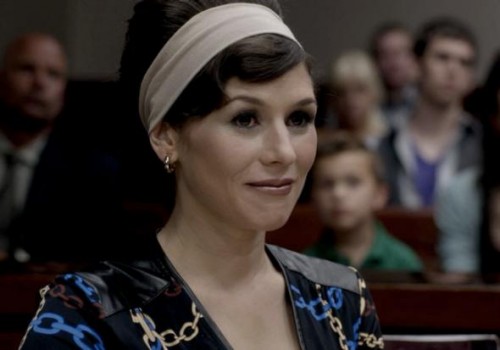
This guest post by Scarlett Harris originally appeared on The Scarlett Woman and is cross-posted with permission.
One of the most explosive backstories on this season of Orange is the New Black has been Lorna Morello’s.
The Italian-American, played by Australian actress Yael Stone, is presumably in prison for credit card fraud, as the opening segments of her life before Litchfield in episode four of the second season that aired last night on Showcase would indicate. We see a Jersey Shore-esque Morello returning to her chaotic familial home after seeing Twilight at the cinema for the “14th time.” She retreats from her accusatory sister, ignorant father, wayward nieces and nephews and sick mother to her bedroom which is adorned with posters of West Side Story (the classic tale of Romeo and Juliet in 1950s New York, with a healthy serving of racism, which Morello is inclined to dish out), male celebrities, and wedding collages. She pauses to caress the glossy face of one of them before calling a mail-order luxury clothing company to request a refund for the patchwork Prada platforms she’s currently wearing but claims she never received.
Many of the women of OITNB have been busted for financial fraud—Sophia and Gloria come to mind—so it seems logical that Morello would be in for a similar crime. But as the episode progresses, it is revealed that Morello’s inner demons are much more extensive. During a trip to the post office to retrieve parcels of designer goods she’ll no doubt attempt to get reimbursed for, she “literally crashes into” the infamous Chris-tuh-phuh, as Morello pronounces it. Christopher promptly asks her out for a coffee after their meet-cute, and the rest is history, if the future Litchfield inmate is to be believed.
The juxtaposition between the following flashback scenes—Morello getting ready for a weekend away with Christopher and her trial on charges of stalking, harassment, violating a restraining order and credit card fraud—illustrates the fractured reality she exists in. Despite Christopher electing not to pursue Lorna after their first date, Morello still believes they’re together years later.
Stone plays Morello so sympathetically the audience feels sorry for her when we—or at least her fellow inmates—should approach with caution. The consensus at Litchfield seems to be that Morello’s fantastical romance with Christopher may not be etched in truth and word slowly starts to get around that her former “fiancé” is marrying another woman. When you’re bonding with Crazy Eyes (whom the show is taking pains in its second season not to fetishise and to address by her given name, Suzanne) about unrequited love, it’s clear that something’s not quite right.
Morello’s abovementioned childlike room, her harping on about how her and Christopher’s romance is “meant to be,” like something out of Notting Hill, Pretty Woman, or Cinderella, and her psychotic break that sees her stealing the prison van to break into Christopher’s marital home, shows just how damaging society’s “wedding industrial complex and… [its] need to infantalise grown women,” as Nicky puts it, can be. It’s also an all-too-common one drummed into Western women everywhere they turn.
In a recent Buzzfeed longread, Anne Helen Peterson dissects the films based on Nicholas Sparks’ novels and their contribution to a Taylor Swiftian world where men perform romance and women have it thrust upon them:
“… Many women (and some men) use Sparks’ narratives to replace the lack of emotional intimacy and satisfaction in their own lives and, as a result, cultivate unrealistic ideals about what a relationship—and love—should resemble…
“The Sparks narrative offers a life—and a love story nested within it—that extracts its protagonist from [the concerns of everyday life] and consolidates the demands of life into one, simple task: Open yourself to love, and love in return.”
In a way Morello is like the mirror image of the Santa Barbara shooter, Elliot Rodger: the same but opposite. Rodger took his anger at his lack of attention from women—spurred on by porn and men’s rights forums—out on the female population in general in the most violent way, whereas Morello continues her stereotypically feminine obsession with romance and fixates on one man, dangerously crafting an alternate life with him. In Morello’s fictional existence no one died, but that’s not to say she didn’t try to kill anyone. (In the courtroom she is accused of strapping a homemade bomb to Christopher’s fiancé’s car.) Think that’s too heavy handed a tar with the same brush? They are both criminals with mental health issues, after all.

In one of the closing scenes of the season, Morello simplistically attempts to explain to the cancer-stricken Miss Rosa the plot of one of her favourite movies, Toy Story (again with the juvenile interests–though, to be fair, Toy Story has universal appeal). Her warped grasp of the children’s classic leads Rosa to exclaim, “You have one fucked up view of the world, kid!”
Scarlett Harris is a Melbourne, Australia-based freelance writer and blogger at The Scarlett Woman, where she muses about feminism, social issues, and pop culture. You can follow her on Twitter.



1 thought on “Morello’s Fractured Relationship with Romance in ‘Orange Is the New Black’”
Comments are closed.